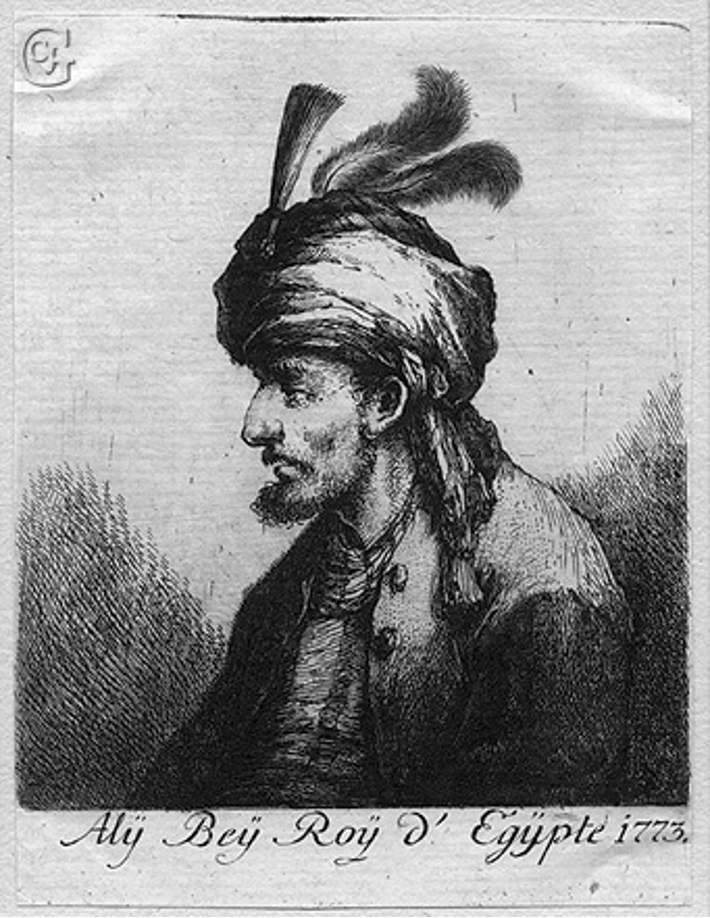Lament for Ali Bey
(Poet's title: Klage um Ali Bey)
Set by Schubert:
D 140
for TTB trio and piano[1815]
D 496A
[November 1816]
Lasst mich, lasst mich, ich will klagen,
Fröhlich sein nicht mehr,
Abu Dahab hat geschlagen
Ali und sein Heer.
So ein muntrer kühner Krieger
Wird nicht wieder sein;
Über alles ward er Sieger,
Haut’ es kurz und klein.
Er verschmähte Wein und Weiber,
Ging nur Kriegesbahn
Und war für die Zeitungsschreiber
Gar ein lieber Mann.
Aber, nun ist er gefallen,
Dass er ‘s doch nicht wär.
Ach, von allen Beys, von allen,
War kein Bey wie er.
Jedermann in Syrus saget:
»Schade, dass er fiel.«
Und in ganz Ägypten klaget
Mensch und Krokodil.
Dhaher sieht im Geist, wie ‘s scheinet,
Am Serail mit Graus
Seines Freundes Kopf und weinet
Sich die Augen aus.
Da Capo.
Leave me! Leave me alone! I want to lament,
I do not want to be merry any more!
Abu al-Dhahab has struck down
Ali and his army.
Such a jolly and bold warrior
Will never be seen again.
He was victorious over everyone
And chopped them up into little pieces.
He denied himself wine and women.
He only took the course of war,
And for the newspaper writers
He was really a favourite man.
But now he has fallen.
If only it had not happened to him!
Oh, out of all the Beys, out of all of them
There was no Bey like him.
Everyone in Syria is saying,
“What a shame that he fell!”
And in the whole of Egypt there is lamenting
By humans and crocodiles.
Dhaher pictures to himself the effect
In the harem and the horror as they see
His friend’s head, and he cries
His eyes out.
Again, from the top
All translations into English that appear on this website, unless otherwise stated, are by Malcolm Wren. You are free to use them on condition that you acknowledge Malcolm Wren as the translator and schubertsong.uk as the source. Unless otherwise stated, the comments and essays that appear after the texts and translations are by Malcolm Wren and are © Copyright.
☙
Themes and images in this text:
Egypt Friends Heads Laments, elegies and mourning Syria Tears and crying War, battles and fighting

It was not just newspaper writers who eagerly followed the career of Ali Bey al-Kabir (1728 – 1773); he featured regularly in the correspondence between Voltaire and Catherine the Great of Russia. After becoming governor of Egypt in 1767 this Mameluke pasha took advantage of the Russo-Turkish War (1768-74) to declare de facto independence from Ottoman overlordship and to invade Gaza and then Syria. His incursion into Gaza was facilitated by an alliance with both Russia and the Palestinian Dhaher al-Omar (1690 – 1775); his attack on Syria was led by Muhammad Bey Abu Dhahab (1735 – 1775). As soon as the decisive battle had been won, Abu Dhahab double-crossed his master and betrayed him to the Sultan in Istanbul. Ali Bey was imprisoned and returned to Cairo, where he soon died. Needless to say some of the details are disputed, but noone claimed that he died peacefully in his bed. It is difficult to ascertain whether his head was ever sent back to his harem.
While all of these dramatic events were being played out in the Middle East a young writer in Wandsbeck, just north-east of Hamburg, was beginning his career as both journalist and poet. Matthias Claudius (1740 – 1815) published his mock lament, Klage um Ali Bey, in his capacity as the ‘Wandsbeck Messenger’ (his journal was called ‘Der Wandsbecker Bothe’) in the 1774 edition of ‘Asmus omnia sua secum portans oder Sämmtliche Werke des Wandsbecker Bothen’ (pages 30 – 31).
It is difficult to imagine how even the most ambitious of local reporters on the periphery of a north German city in the 1770’s would be in a position to comment meaningfully on contemporary events on the Nile or in Damascus. What would they have known of harems or of crocodiles? The orientalist details about the Seraglio might have come from the 1001 Nights, in the popular French version by Galland (1704 ff), but Matthias Claudius is unlikely to have seen a living crocodile.
Lepidus: What manner o' thing is your crocodile? Antony: It is shaped, sir, like itself, and it is as broad as it has breadth. It is just so high as it is, and moves with its own organs. It lives by that which nourisheth it, and, the elements once out of it, it transmigrates. Lepidus: What colour is it of? Antony: Of its own colour too. Lepidus: 'Tis a strange serpent. Antony: 'Tis so, and the tears of it are wet. (Shakespeare, Antony and Cleopatra Act II, Scene 7)
Claudius must have known enough to get this joke, since a number of classical writers (e.g Plutarch and Livy) used the phrase ‘crocodile tears’ in its modern sense. There can be little doubt that the tone of the ‘Klage um Ali Bey’ as a whole is based on the idea of shedding dry, insincere tears.
☙
Original Spelling
Klage um Aly Bey
Laßt mich! laßt mich! ich will klagen,
Fröhlich seyn nicht mehr!
Aboudahab hat geschlagen
Ali und sein Heer.
So ein muntrer kühner Krieger
Wird nicht wieder seyn;
Ueber alles ward er Sieger,
Haut' es kurz und klein.
Er verschmähte Wein und Weiber,
Ging nur Kriegesbahn,
Und war für die Zeitungsschreiber
Gar ein lieber Mann.
Aber, nun ist er gefallen.
Dass er 's doch nicht wär!
Ach, von allen Bey's, von allen
War kein Bey wie er.
Jedermann in Sirus saget:
»Schade, daß er fiel!«
Und in ganz Egypten klaget
Mensch und Crocodil.
Daher sieht im Geist, wie 's scheinet,
Am Serail mit Graus
Seines Freundes Kopf, und weinet
Sich die Augen aus.
Da Capo.
Confirmed by Peter Rastl with Schubert’s probable source, ASMUS omnia sua SECUM portans, oder Sämmtliche Werke des Wandsbecker Bothen, I. und II. Theil. Beym Verfasser, und in Commißion bey Fr. Perthes in Hamburg. [1774], pages 48-49.
First published in Der Deutsche, sonst Wandsbecker Bothe. Ao. 1773. No. 112. Mittwochs, den 14ten Julii.
To see an early edition of the text, go to page 48 [72] – 48 here: https://resolver.sub.uni-hamburg.de/kitodo/PPN840695020


